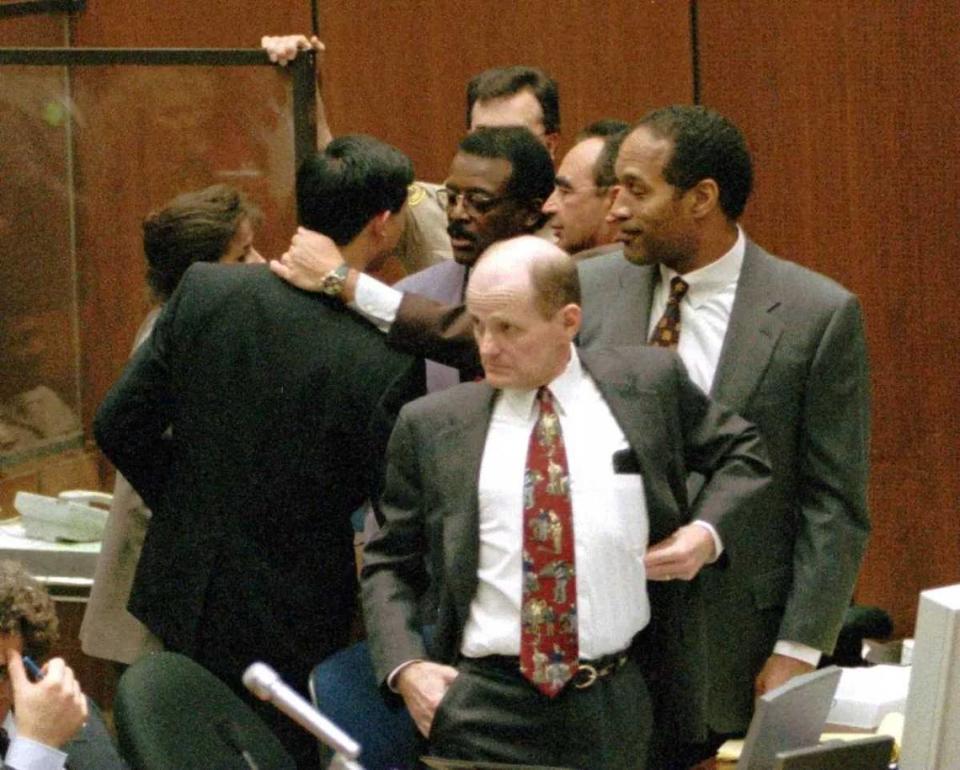Did OJ Simpson do it? To a Sacramento-area attorney who defended him, that’s irrelevant
- Oops!Something went wrong.Please try again later.
Robert Blasier, an El Dorado County attorney who helped mount the criminal defense in O.J. Simpson’s murder trial and lived with his client for a year during the civil suit against him, said on the day of his former client’s death that “extremely sloppy” police work was key to Simpson’s acquittal in the criminal case.
Simpson was found responsible for the deaths in a subsequent civil case. He died Thursday of cancer.
Simpson was tried for — and found not guilty of — the 1994 murders of his ex-wife, Nicole Brown Simpson, and her friend Ron Goldman.
Shortly after the killings, Barry Scheck, a lead attorney on Simpson’s legal “dream team,” called Blasier because he’d seen him speak about DNA in criminal cases. Scheck wanted to bring in a lawyer who would focus on the forensic evidence.
In the mid-’90s, DNA was still relatively new to court cases.
“Once you do one DNA litigation case,” Blasier said with a laugh, “you become an expert.”
A few years before the Simpson trial, Blasier had gotten DNA evidence suppressed in Sacramento’s Peppermill murder case. His client, Paul Mack, was convicted in 1990 of the 1987 rape and murder of Karen Grace Winslett, a host at the Peppermill restaurant. She was 21.
At the time, Blasier argued “that the technology was much too new.” The judge agreed. Blasier went on to speak at events for fellow attorneys about getting that forensic evidence excluded from trial.
Simpson’s trial featured ample forensic evidence suggesting he killed his ex-wife and her friend at her home. Blasier poked holes in it.
“First of all, (investigators) were extremely sloppy with all of the DNA evidence that they collected,” he said. “We were able to show that there was reasonable doubt about a lot of pieces of evidence.”
Nicole’s accounts of Simpson’s long-standing pattern of domestic violence were excluded from the murder trial as hearsay. Nicole had told friends and family that he was abusive, and, as the Daily Mail reported, she had written in her diary about dozens of beatings at the hands of her husband, a 6-foot-1 former NFL running back.
Asked about the domestic violence, Blasier said, “They were both very volatile in their relationship.” Asked about the size difference between the pair, he said, “He didn’t use his physical force to overwhelm her at all.”
Simpson’s legal team factored the violence into their strategy. If Simpson testified, “We were afraid that he would just really incriminate himself because of the past domestic violence issues,” Blasier said. “He wanted to testify. But we finally convinced him not to do that.”
Blasier said he was present at the jail the day Simpson decided not to take the stand.
“We brought in two female attorneys from the Bay Area to do a mock cross-examination at the jail,” he said. “And I was one of the attorneys who was there. There was one other attorney who was there, and we watched all of it. And that was enough to convince him that he shouldn’t testify.”
The female attorneys, he said, cracked his client.

Did O.J. Simpson do it? ‘You just don’t make judgments’
Blasier lived in Simpson’s home for a year during the civil trial brought by the parents of the victims. He said he was the only attorney to serve on Simpson’s defense for both cases, and that he stayed in the same guest room at Simpson’s Rockingham estate where witness Kato Kaelin had been staying the night of the murders.
During that year of living with Simpson, Blasier said he “got to know him very well. And he’s a very charismatic and kind person.” He was “fun to be around, quite frankly.”
Still, he said he is unsure whether his former client is guilty of the murders.
“I have the same answer that I give to everybody, and that is, I wasn’t there at the time of the homicide, so I have no idea what happened,” he said. “All I can do is judge what I experienced myself. And I don’t know. I don’t know the answer to that question. And it’s not important to me.”
That detachment, he said, is part of being a criminal defense attorney.
“It would cloud my judgment in representing somebody, and I represent a lot of people who have done a lot of horrible things,” he said. “You do the best job you can, and you don’t make any judgments about guilt. Once they make me a judge, then I can make those kinds of assessments, but it’s not my job. And I try very hard to stay away from making those kinds of judgments. It’s not something that I would do.”
He said, “You just don’t make judgments about guilt if you’re going to be a representative for the defendant.”
Blasier, now 79, is semi-retired but still working on some cases — he’s about to take on a murder case in Amador County.
His biggest piece of advice to people who have been accused of a crime is this: Get an attorney immediately, and “don’t talk to the police.”


